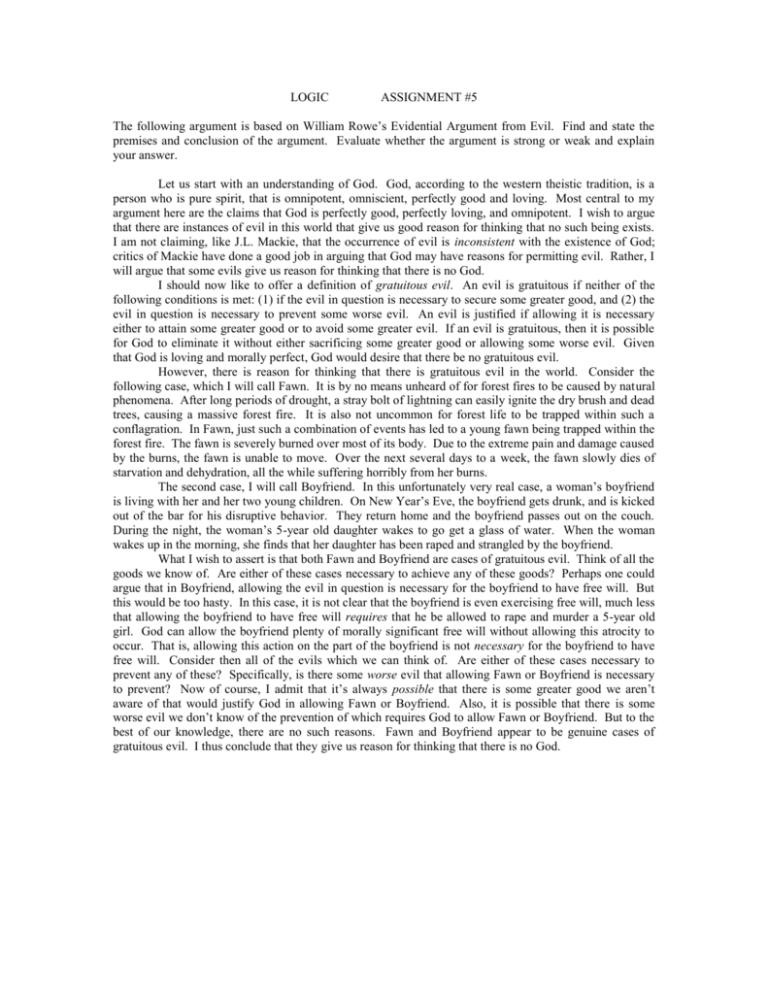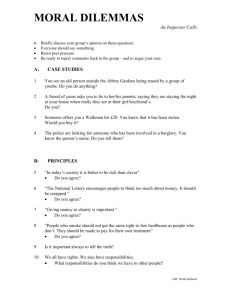Inductive Argument Analysis
advertisement

LOGIC ASSIGNMENT #5 The following argument is based on William Rowe’s Evidential Argument from Evil. Find and state the premises and conclusion of the argument. Evaluate whether the argument is strong or weak and explain your answer. Let us start with an understanding of God. God, according to the western theistic tradition, is a person who is pure spirit, that is omnipotent, omniscient, perfectly good and loving. Most central to my argument here are the claims that God is perfectly good, perfectly loving, and omnipotent. I wish to argue that there are instances of evil in this world that give us good reason for thinking that no such being exists. I am not claiming, like J.L. Mackie, that the occurrence of evil is inconsistent with the existence of God; critics of Mackie have done a good job in arguing that God may have reasons for permitting evil. Rather, I will argue that some evils give us reason for thinking that there is no God. I should now like to offer a definition of gratuitous evil. An evil is gratuitous if neither of the following conditions is met: (1) if the evil in question is necessary to secure some greater good, and (2) the evil in question is necessary to prevent some worse evil. An evil is justified if allowing it is necessary either to attain some greater good or to avoid some greater evil. If an evil is gratuitous, then it is possible for God to eliminate it without either sacrificing some greater good or allowing some worse evil. Given that God is loving and morally perfect, God would desire that there be no gratuitous evil. However, there is reason for thinking that there is gratuitous evil in the world. Consider the following case, which I will call Fawn. It is by no means unheard of for forest fires to be caused by natural phenomena. After long periods of drought, a stray bolt of lightning can easily ignite the dry brush and dead trees, causing a massive forest fire. It is also not uncommon for forest life to be trapped within such a conflagration. In Fawn, just such a combination of events has led to a young fawn being trapped within the forest fire. The fawn is severely burned over most of its body. Due to the extreme pain and damage caused by the burns, the fawn is unable to move. Over the next several days to a week, the fawn slowly dies of starvation and dehydration, all the while suffering horribly from her burns. The second case, I will call Boyfriend. In this unfortunately very real case, a woman’s boyfriend is living with her and her two young children. On New Year’s Eve, the boyfriend gets drunk, and is kicked out of the bar for his disruptive behavior. They return home and the boyfriend passes out on the couch. During the night, the woman’s 5-year old daughter wakes to go get a glass of water. When the woman wakes up in the morning, she finds that her daughter has been raped and strangled by the boyfriend. What I wish to assert is that both Fawn and Boyfriend are cases of gratuitous evil. Think of all the goods we know of. Are either of these cases necessary to achieve any of these goods? Perhaps one could argue that in Boyfriend, allowing the evil in question is necessary for the boyfriend to have free will. But this would be too hasty. In this case, it is not clear that the boyfriend is even exercising free will, much less that allowing the boyfriend to have free will requires that he be allowed to rape and murder a 5-year old girl. God can allow the boyfriend plenty of morally significant free will without allowing this atrocity to occur. That is, allowing this action on the part of the boyfriend is not necessary for the boyfriend to have free will. Consider then all of the evils which we can think of. Are either of these cases necessary to prevent any of these? Specifically, is there some worse evil that allowing Fawn or Boyfriend is necessary to prevent? Now of course, I admit that it’s always possible that there is some greater good we aren’t aware of that would justify God in allowing Fawn or Boyfriend. Also, it is possible that there is some worse evil we don’t know of the prevention of which requires God to allow Fawn or Boyfriend. But to the best of our knowledge, there are no such reasons. Fawn and Boyfriend appear to be genuine cases of gratuitous evil. I thus conclude that they give us reason for thinking that there is no God.








